一般过去时专项练习及动词过去式变化规则
- 格式:doc
- 大小:40.00 KB
- 文档页数:3
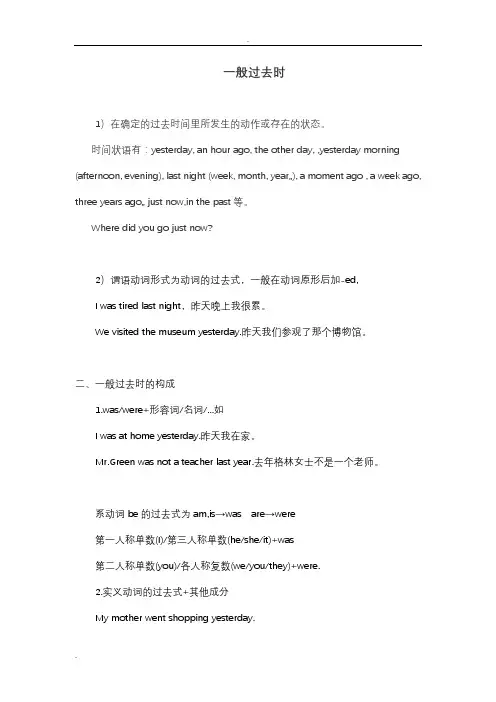
一般过去时1)在确定的过去时间里所发生的动作或存在的状态。
时间状语有:yesterday, an hour ago, the other day, ,yesterday morning (afternoon, evening), last night (week, month, year…), a moment ago , a week ago, three years ago… just now,in the past等。
Where did you go just now?2)谓语动词形式为动词的过去式,一般在动词原形后加-ed,I was tired last night,昨天晚上我很累。
We visited the museum yesterday.昨天我们参观了那个博物馆。
二、一般过去时的构成1.was/were+形容词/名词/...如I was at home yesterday.昨天我在家。
Mr.Green was not a teacher last year.去年格林女士不是一个老师。
系动词be的过去式为am,is→was are→were第一人称单数(I)/第三人称单数(he/she/it)+was第二人称单数(you)/各人称复数(we/you/they)+were.2.实义动词的过去式+其他成分My mother went shopping yesterday.我妈妈昨天去购物了。
His uncle worked in Beijing in 2014.他叔叔2014年在北京工作。
三、一般过去时的句式四、动词过去式的变化规则3 used toused to + do:"过去常常"表示过去习惯性的动作或状态,但如今已不存在。
Mother used to take a walk. (过去常常散步)二、构成及变化1. Be动词在一般过去时中的变化:am 和is在一般过去时中变为was。
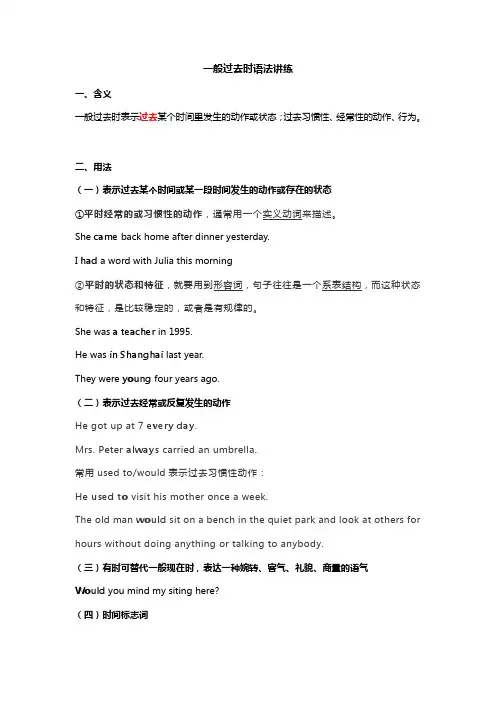
一般过去时语法讲练一、含义一般过去时表示过去某个时间里发生的动作或状态;过去习惯性、经常性的动作、行为。
二、用法(一)表示过去某个时间或某一段时间发生的动作或存在的状态①平时经常的或习惯性的动作,通常用一个实义动词来描述。
She came back home after dinner yesterday.I had a word with Julia this morningHe was in Shanghai last year.They were young four years ago.(二)表示过去经常或反复发生的动作He got up at 7 every day.Mrs. Peter always carried an umbrella.常用used to/would表示过去习惯性动作:He used to visit his mother once a week.The old man would sit on a bench in the quiet park and look at others for hours without doing anything or talking to anybody.(三)有时可替代一般现在时,表达一种婉转、客气、礼貌、商量的语气Would you mind my siting here?(四)时间标志词yesterday, the day before yesterday, last week/year/summer , two/three/days/weeks ago, that morning/winter/day/year, those days/years, at that time/moment, in 1990, just now, in the old days, two hours later, one day, when I was …years old/when I was young…三、句型结构(一)be动词四、动词过去式(过去式)的变化规则(一)直接加edlisten-listened visit-visited walk-walked(二)以e结尾,直接加dlive-lived hope-hoped(三)以辅音字母加y结尾的动词,变y为i加edcarry-carried study-studied(四)以重读闭音节结尾,如末尾只有一个辅音字母,双写辅音字母加edshop-shopped stop-stopped drop-dropped plan-planned fit-fitted prefer-preferredI lived ( live )in Shanghai in 2003.(五)不规则动词过去式的变化需特殊记忆buy-bought go-went read-readI read (read) English yesterday morning.【注意事项】1、一般过去时只说明过去的事情,不强调动作对现在的影响。
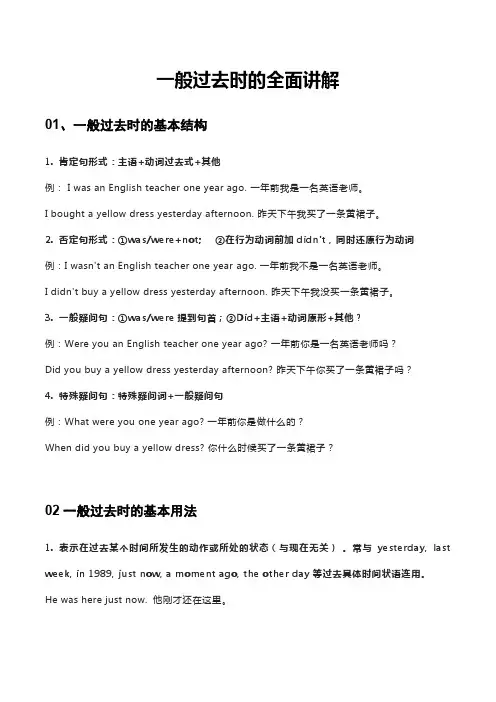
一般过去时的全面讲解01、一般过去时的基本结构1. 肯定句形式:主语+动词过去式+其他例: I was an English teacher one year ago. 一年前我是一名英语老师。
I bought a yellow dress yesterday afternoon. 昨天下午我买了一条黄裙子。
2. 否定句形式:①was/were+not; ②在行为动词前加didn't,同时还原行为动词例:I wasn't an English teacher one year ago. 一年前我不是一名英语老师。
I didn't buy a yellow dress yesterday afternoon. 昨天下午我没买一条黄裙子。
3. 一般疑问句:①was/were提到句首;②Did+主语+动词原形+其他?例:Were you an English teacher one year ago? 一年前你是一名英语老师吗?Did you buy a yellow dress yesterday afternoon? 昨天下午你买了一条黄裙子吗?4. 特殊疑问句:特殊疑问词+一般疑问句例:What were you one year ago? 一年前你是做什么的?When did you buy a yellow dress? 你什么时候买了一条黄裙子?02一般过去时的基本用法1. 表示在过去某个时间所发生的动作或所处的状态(与现在无关)。
常与yesterday, last week, in 1989, just now, a moment ago, the other day等过去具体时间状语连用。
He was here just now. 他刚才还在这里。
What did you do yesterday? 你昨天做了什么事?2. 在过去一段时间内的经常性或习惯性动作。

----动词过去式变化规则规则动词的过去式变化如下:一般情况下,动词词尾加-ed ,如:worked played wanted acted以不发音的-e 结尾动词,动词词尾加-d,如:lived moved decided declined hoped judged raised wiped以辅音字母+ y 结尾的动词,把 -y 变为 -i再加 -ed,如:studied tried copied justified cried carried embodied emptied以一个辅音字母结尾的重读闭音节动词,双写词尾辅音字母,再加 -ed,如:stopped beggedfretted dragged dropped planned dotted dripped注:不规则动词的过去式变化规律性不强,须多加记忆。
go –went make - made get - got buy - boughtcome - came fly-flew不规则动词的过去式:a.过去式与动词原形的拼写形式相同:let → let, put→ put, read 注意→readread(的过去式读 [red])b. i→ a:begin→ began, drink→ drank, give→ gave, ring→ rang, sing→ sang, sit→ sat, swim c. i→ o:drive→ drove, ride→ rode, write→ wroted. ow→ ew:grow→ grew, know→ knew, throw→ threwe. 含 ough 或 augh 的:bring→ brought, buy→ bought, think;→catchthought→ caught, teach→ taughtf. am is ---was are ---were do---did can---couldcome---came不规则动词的过去式平时出现要留心,逐个熟记,注意积累。
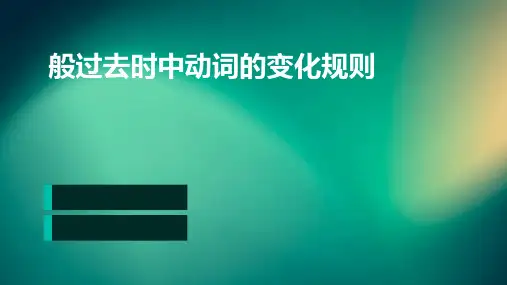
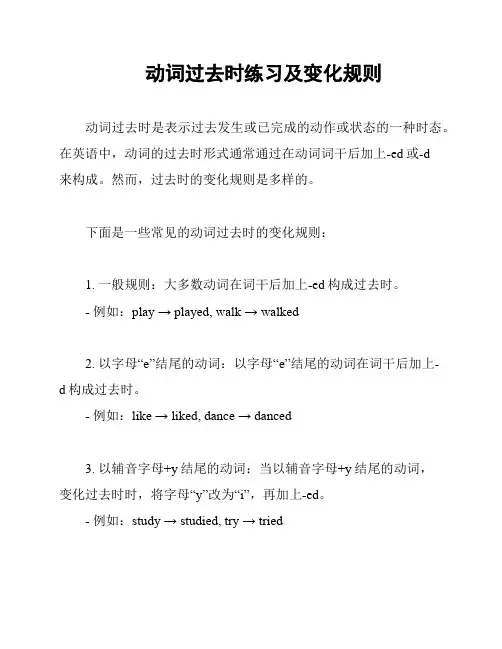
动词过去时练习及变化规则
动词过去时是表示过去发生或已完成的动作或状态的一种时态。
在英语中,动词的过去时形式通常通过在动词词干后加上-ed或-d
来构成。
然而,过去时的变化规则是多样的。
下面是一些常见的动词过去时的变化规则:
1. 一般规则:大多数动词在词干后加上-ed构成过去时。
- 例如:play → played, walk → walked
2. 以字母“e”结尾的动词:以字母“e”结尾的动词在词干后加上-
d构成过去时。
- 例如:like → liked, dance → danced
3. 以辅音字母+y结尾的动词:当以辅音字母+y结尾的动词,
变化过去时时,将字母“y”改为“i”,再加上-ed。
- 例如:study → studied, try → tried
4. 以重读闭音节结尾的单词:当一个单词以重读闭音节结尾,并且末尾只有一个辅音字母,需要重复结尾的辅音字母,并加上-ed。
- 例如:stop → stopped, plan → planned
5. 不规则动词:有一些动词的过去时形式并不遵循上述规则,而是具有特殊的变化形式。
- 例如:go → went, be → w as/were
如需深入了解动词过去时的变化规则和练,请参考相关英语语法教材或在线研究资源。
在练过程中,通过大量的阅读和练,你将更加熟练地运用和理解动词过去时。
希望以上信息对你有所帮助!。
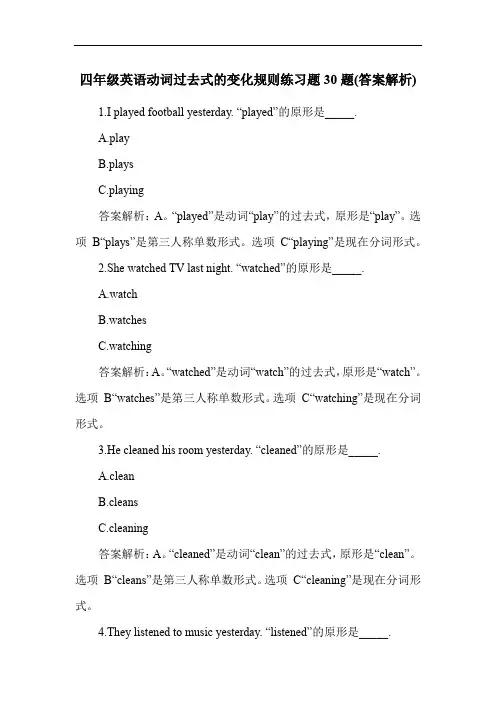
四年级英语动词过去式的变化规则练习题30题(答案解析)1.I played football yesterday. “played”的原形是_____.A.playB.playsC.playing答案解析:A。
“played”是动词“play”的过去式,原形是“play”。
选项B“plays”是第三人称单数形式。
选项C“playing”是现在分词形式。
2.She watched TV last night. “watched”的原形是_____.A.watchB.watchesC.watching答案解析:A。
“watched”是动词“watch”的过去式,原形是“watch”。
选项B“watches”是第三人称单数形式。
选项C“watching”是现在分词形式。
3.He cleaned his room yesterday. “cleaned”的原形是_____.A.cleanB.cleansC.cleaning答案解析:A。
“cleaned”是动词“clean”的过去式,原形是“clean”。
选项B“cleans”是第三人称单数形式。
选项C“cleaning”是现在分词形式。
4.They listened to music yesterday. “listened”的原形是_____.A.listenB.listensC.listening答案解析:A。
“listened”是动词“listen”的过去式,原形是“listen”。
选项B“listens”是第三人称单数形式。
选项C“listening”是现在分词形式。
5.We visited our grandparents last weekend. “visited”的原形是_____.A.visitB.visitsC.visiting答案解析:A。
“visited”是动词“visit”的过去式,原形是“visit”。
选项B“visits”是第三人称单数形式。

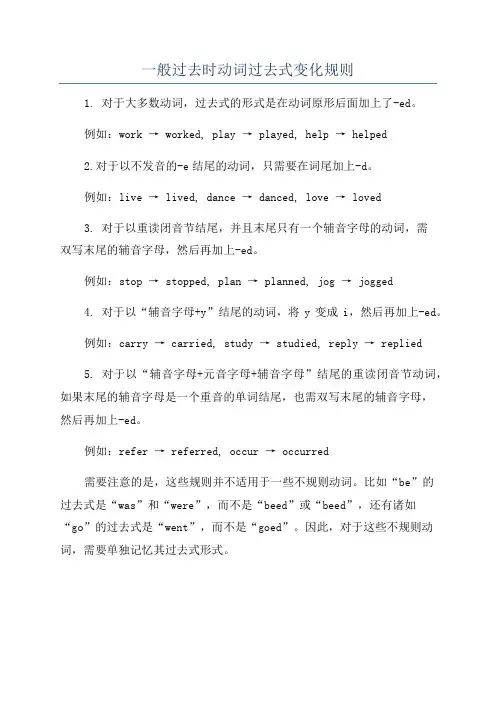
一般过去时动词过去式变化规则
1. 对于大多数动词,过去式的形式是在动词原形后面加上了-ed。
例如:work → worked, play → played, help → helped
2.对于以不发音的-e结尾的动词,只需要在词尾加上-d。
例如:live → lived, dance → danced, love → loved
3. 对于以重读闭音节结尾,并且末尾只有一个辅音字母的动词,需
双写末尾的辅音字母,然后再加上-ed。
例如:stop → stopped, plan → planned,jog → jogged
4. 对于以“辅音字母+y”结尾的动词,将y变成i,然后再加上-ed。
例如:carry → carried, study → studied, reply → replied
5. 对于以“辅音字母+元音字母+辅音字母”结尾的重读闭音节动词,如果末尾的辅音字母是一个重音的单词结尾,也需双写末尾的辅音字母,
然后再加上-ed。
例如:refer → referred, occur → occurred
需要注意的是,这些规则并不适用于一些不规则动词。
比如“be”的
过去式是“was”和“were”,而不是“beed”或“beed”,还有诸如“go”的过去式是“went”,而不是“goed”。
因此,对于这些不规则动词,需要单独记忆其过去式形式。
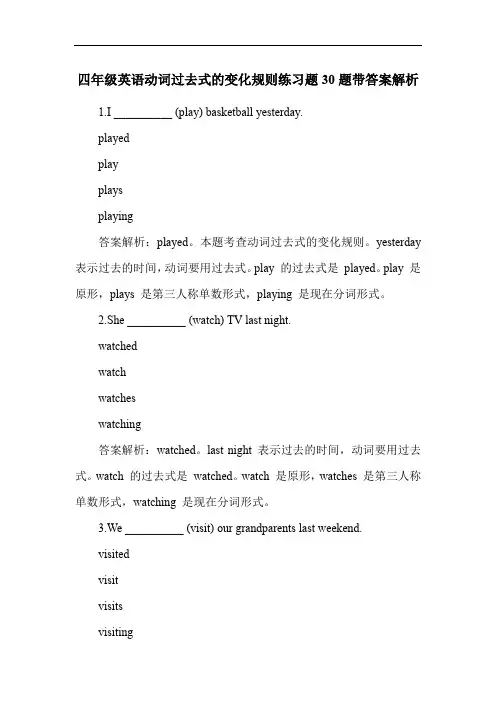
四年级英语动词过去式的变化规则练习题30题带答案解析1.I __________ (play) basketball yesterday.playedplayplaysplaying答案解析:played。
本题考查动词过去式的变化规则。
yesterday 表示过去的时间,动词要用过去式。
play 的过去式是played。
play 是原形,plays 是第三人称单数形式,playing 是现在分词形式。
2.She __________ (watch) TV last night.watchedwatchwatcheswatching答案解析:watched。
last night 表示过去的时间,动词要用过去式。
watch 的过去式是watched。
watch 是原形,watches 是第三人称单数形式,watching 是现在分词形式。
3.We __________ (visit) our grandparents last weekend.visitedvisitvisitsvisiting答案解析:visited。
last weekend 表示过去的时间,动词要用过去式。
visit 的过去式是visited。
visit 是原形,visits 是第三人称单数形式,visiting 是现在分词形式。
4.He __________ (clean) his room yesterday afternoon.cleanedcleancleanscleaning答案解析:cleaned。
yesterday afternoon 表示过去的时间,动词要用过去式。
clean 的过去式是cleaned。
clean 是原形,cleans 是第三人称单数形式,cleaning 是现在分词形式。
5.They __________ (go) to the park last Sunday.wentgogoesgoing答案解析:went。
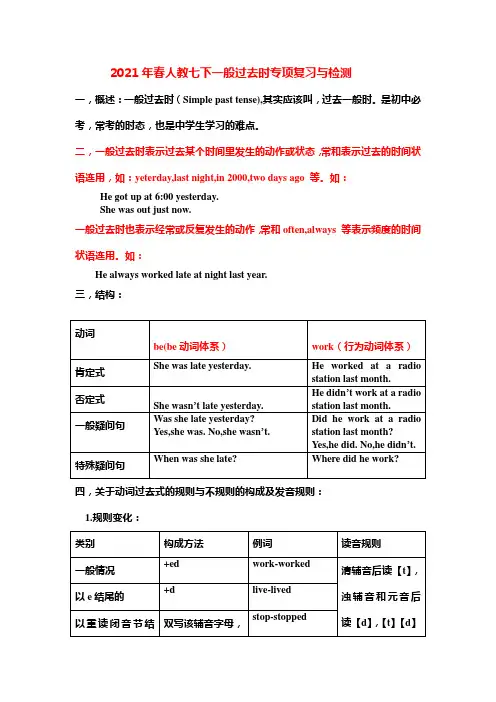
2021年春人教七下一般过去时专项复习与检测一,概述:一般过去时(Simple past tense),其实应该叫,过去一般时。
是初中必考,常考的时态,也是中学生学习的难点。
二,一般过去时表示过去某个时间里发生的动作或状态,常和表示过去的时间状语连用,如:yeterday,last night,in 2000,two days ago 等。
如:He got up at 6:00 yesterday.She was out just now.一般过去时也表示经常或反复发生的动作,常和often,always 等表示频度的时间状语连用。
如:He always worked late at night last year.三,结构:四,关于动词过去式的规则与不规则的构成及发音规则:规则变化:1.2.常见不规则动词过去式:A-A形(原形、过去式同形)改动元音字母型的(改动一个元音字母)A-B型(完全不一样)一般过去时专项练习一,基础训练。
写出下列单词的过去式。
1.look______2.play______3.study_______4.hope_______e______6.arrive______7.cross_______8.listen_______9.watch_______10.fight_____ 11.relax_______12.follow_________13.save________14.shop________15.cook_______16.visit_______17.turn_______18.climb______19.enjoy____ 20.answer_______21.pick______22.stay______23.shout______24.move____ 25.sing_____26.swim______27.tell______28write______29make_______ 30.get_____31.run______32.ride________33.drive_______34.leave_______ 35.wear_______36.bring_______37.go______e______39.read______ 40.feel_______41.keep______42.sleep______43.forget________44.cut_____ 45.drink_______46.sit______47.pay_______48.spend_______49.put_______ 50.blow_______51.feed_______52.grow_______53.hear______54.fly_______ 55.wake________二,根据括号中单词的适当形式填空。
小学英语语法一般过去时(包括练习)一般情况下,动词过去式的变化规则为在词尾加-ed,如:walk-walked、play-played等。
但是也有一些不规则动词需要特别注意,如:go-went、eat-ate等。
在过去时中,我们要注意使用适当的时间状语来指明动作发生的时间。
常用的时间状语包括yesterday、the day before yesterday、just now等。
同时,我们还要注意be动词在过去时中的变化,am和is变为was,are变为were。
另外,没有be动词的一般过去时句子中,否定句要使用didn’t +动词原形,疑问句要在句首加did,动词过去式变回原形。
动词过去式的变化规则一般为在词尾加-ed,但也有一些不规则动词需要特别注意。
1.一般在动词末尾加-ed,例如:pull变成pulled,cook变成cooked。
2.如果结尾是e,则加d,例如:XXX变成tasted。
3.对于末尾只有一个元音字母和一个辅音字母的重读闭音节,应该双写末尾的辅音字母,再加-ed,例如:ped。
4.对于以“辅音字母+y”结尾的动词,需要变y为i,再加-ed,例如:study变成studied。
5.不规则动词过去式包括:am/is变成was,are变成were,begin变成began,speak变成spoke,swim变成swam,build变成built,spend变成spent,XXX变成took,buy变成bought,see变成saw,teach变成taught,run变成ran,stand变成stood,tell变成told,say变成said,sweep变成swept,think变成thought,will变成would,drive变成drove,know变成knew,write变成wrote,eat变成ate,learn变成learnt或learned,sing变成sang,feel变成felt,let变成let,sit变成sat,find变成found,make变成made,sleep变成slept,fly变成flew,mean变成meant,come变成came,ot,meet变成met,copy变成copied,get变成got,put变成put,do变成did,give变成gave,read变成read,draw变成drew,hear变成heard,ride变成rode,XXX变成drank,keep变成kept,ring变成rang。
(完整版)小学历史一般过去时讲解及练习小学历史一般过去时讲解及练一、一般过去时的用法一般过去时是用来描述过去发生的事情或状态的一种时态。
在一般过去时中,动词的形式变化为过去式。
二、一般过去时的动词变化规则1. 对于大部分动词,直接在动词后加上-ed构成过去时。
例如:play -> played,walk -> walked。
2. 对于以不发音的e结尾的动词,直接在动词后加-d构成过去时。
例如:live -> lived,love -> loved。
3. 对于以一个辅音字母加上y结尾的动词,先将y变为i,再加-ed构成过去时。
例如:study -> studied,try -> tried。
三、一般过去时的例句1. 我在学校玩得很开心。
- I had a great time at school.2. 她昨天去了北京。
- She went to Beijing yesterday.3. 我们参观了博物馆。
- We visited the museum.4. 他们昨晚没看电影。
- They didn't watch a movie last night.5. 昨天是我的生日。
- Yesterday was my birthday.四、练题请根据下面的句子,使用合适的动词形式填空,完成句子。
1. She ___ (eat) dinner at home last night.2. We ___ (visit) the zoo yesterday.3. They ___ (play) soccer in the park.4. He ___ (watch) a movie with his friends.5. I ___ (study) for the test all night.答案:1. ate2. visited3. played4. watched5. studied以上就是小学历史一般过去时的讲解及练习。
动词过去式的变化规则一、规则动词的过去式1.动词原形+-ed(大部分动词)want—wanted work—worked need—needed clean—cleaned wash—washed play—played spell—spelled help--helped2.以不发音的e结尾的在词尾加-dlike—liked live—lived use—used move—moved hope—hoped dance—danced3.以一个元音字母(A/E/I/O/U)加一个辅音字母结尾的重读闭音节动词,先双写结尾的辅音字母,再加-edstop—stopped, trip—tripped4.以辅音字母加y结尾的动词,先把y变成i,再加-edstudy—studied carry—carried hurry—hurried marry—married copy—copied cry—cried二、不规则动词的过去式1. 以t结尾的词,过去式与原形相同。
put—put let—let cut—cut beat—beat2. 以d结尾的词,把d变成t。
build—built lend—lent send—sent spend—spent3. 以n结尾的词,在词后加t。
mean—meant burn—burnt learn—learnt4. 以ow / aw结尾的词,把ow / aw变成ew。
blow—blew draw—drew know—knew grow—grew 5. 含有双写字母的词,将双写改为单写,在词尾加t。
keep—kept sleep—slept feel—felt smell—smelt 6. 含有元音字母o / i的词,将o / i变成a。
sing—sang give—gave sit—sat drink—drank我们目前已学动词的过去式什么时候用一般过去时呢???1.表示在过去某一时间内发生的动作或情况◆①带有确定的过去时间状语morning five daysyesterday afternoon one week agoevening three minutesthe day before yesterday three hoursyear morninglast month one dayday the other day that year 其他when I was youngmorning just noweg. I went to school on foot yesterday.I finished my homework last week.◆②没有确定的过去时间状语时eg. I thought you were ill. 我原以为你生病了(这句话说明在说话之前我以为你病了,但是现在我知道你没病)2.表示过去一段时间内经常或反复发生的动作(常与always,never,often 等频度副词连用)eg. Peter always carried an umbrella. Peter 常常带着伞I never drank wine. 我从不喝酒一般过去时的句型肯定句:主语+行为动词过去式/be动词过去式eg : We played football yesterday.I was happy last night.否定句:did not / didn’t + 行为动词原型Was not / wasn’t + 其他Were not / weren’t + 其他eg:I didn’t finish my homework.I wasn’t happy last night.We weren’t finish our team work.一般疑问句:Did + 主语+ 行为动词原型?Was /Were + 主语+ 其他成分eg: -----Did you go shopping yesterday?-----Yes, I did. / No ,I didn’t.Was she 15 years old last year?特殊疑问句;特殊疑问词+ did + 主语+ 行为动词原型?特殊疑问词was / were + 主语+ 其他成分?eg: Where did you go on vacation?When and where were you born?一般过去时练习题一、单项选择:从下列各题后所给的四个选项中选择最佳答案填空。
一般过去时专项练习及动词过去式变化规则动词过去式变化规则一、规则变化1、一般情况下,动词词尾加-ed,,如:work—worked play—played want—wanted ask—asked2、以不发音的-e结尾动词,动词词尾加-d,如:live—lived move—moved taste—tasted3、以“辅音字母+y”结尾的动词,把y改成I,加—ed, 如:study—studies try—tried copy—copied carry—carried4、重读闭音节动词,以“辅元辅”结尾,双写词尾辅音字母,再加—ed, 如:stop—stopped二、不规则变化Is /am—was are—were do—did have/ has—had go—went meet—met come—came take—took steal—stole eat—ate fly—flew run—ran see—saw say—said make—made find—found stand—stood sit—sat sing—sang drink—drank give—gave ring—rang swim—swam write—wrote ride—rode drive—drove draw—drew grow—grew know—knew get—got forget—forgot sweep—swept keep—kept sleep—slept speak—spoke break—broke tell—told sell—sold buy—bought think—thought catch—caught teach—taught build—built can—could shall—should will—would过去式与动词原形一样:let—let must—must put—put read—read三、动词过去式构成读音1、清辅音后读清辅音[t] (清读清)如:jump like2、浊辅音后读浊辅音[d] (浊读浊)如:listen pull3、元音后面读浊辅音[d] (元音后面读浊音)如:water play4、[t][d]后面读[id] want need一般过去时专项练习一、写出下列动词的过去式1.am/is ______2.do _______3.go ________4.have _______5.isn’t _________6. ar en’t ________7.spend________8.cook_______9.read________10.clean_______ 11.live _______ 12.study_________三、用括号内所给词的适当形式填空1. We _________ (enjoy) ourselves at the party last night.2.Jack ____________ (study) for the English test last Sunday.3._______ you ______ (go) to the Great Wall last year?4. What day _______ (be) it yesterday?5.The old man _______(be)ill and went to see a doctor.6.We ________ (have) a party last night.7.We __________ (visit) the museum and went home.8.— How _______ (be) the students? — They were very friendly.9.He often _______ (have) supper at home. Today he ______ (have) supper at school.10.— ______ he _______ (have) lunch at nine? —No, he didn’t.11.They _________(buy) a guitar yesterday.五、选择填空( ) 1. Lee ____ his mobile phone at home. A. leave B. leaves C. leaved D. left( ) 2. ___ he ___a good rest? No, he didn’t. A. Do, had B. Did, have C. Did, had D. Was, had ( ) 3. As soon as he __, he _ to his family.A. arrived, writesB. arrived, writtenC. arrived, wroteD. arriveds, write( ) 4. Mr. Black was late because he _______ his way. A. losted B. lose C. loses D. lost ( ) 5. When _________ Lee ________ school this morning?A. did, got toB. did, get toC. did, getD. did, got( ) 6. Will you please say it again? I _ quite __you.A. didn’t, hearB. don’t, heardC. didn’t, heardD. don’t, hear( ) 7. _you __at six o’clock yesterday? A. Do ,ge t up B. Did, get up C. Do, got up D. Did, got up ( ) 8.What did you see ____? A. now B. every day C. these days D. just now( ) 9.He went into the room and ____ the door. A. lock B. locking C. locks D. locked ( ) 10. What __ you __last week? I bought a bag.A. did ,buy B. did , bought C. do, buy D. do, bought ( ) 11. —__he __his lunch? — Yes, he did. A. Does ,has B. Does, have C. Did, have D. Did, had ( )12.—Did the thieves _____ into the car? —No, they______.A. fell, didn’tB. fall(落下), didC. jump(跳), didn’tD. jump, did( ) 13. -When did May come back from Hong Kong? -She __ from Hong Kong last Friday.A. come backB. comes backC. returned backD. came back( ) 14. ____ she _____ this dictionary in the bookshop nearby last week?A. Did, buyB. Does, buyC. Did, boughtD. Does, buys( ) 15. He ____ to the station this morning and was______ for the train.A. hurry, in timeB. hurries, on timeC. hurried, in timeD. hurried, at time( ) 16. Where _____ Uncle Sun yesterday? A. was B. were C. did D. does( ) 17. —Have you seen him today? —Yes, I ____ him this morning.A. seeingB. seeC. seesD. saw( ) 18. He ____worried when he heard the news. A. is B. was C. does D. did( ) 19. There ___ a telephone call for my brother Steven yesterday? A. is B. are C. was D. were ( ) 20. Liu Fengwei _____ three yuan for the lost library book.A. paidB. payC. spentD. lost( ) 21. He __ in this school in 1958. A. taught B. teach C. teaches D. teaching( ) 22. They __ tired so they stopped __a rest.A. are, haveB. were, haveC. were, to haveD. are, having( ) 23. Yesterday I _____ in bed all day because I had a fever. A. lay B. lie C. laid D. lied ( ) 24. It was raining hard when he ____ home. A. got B. get C. gets D. was getting( ) 25. She said her brother ____ in Beijing. He ______ to Japan on business last week.A. wasn’t, wentB. hasn’t, wentC. wasn’t, goD. isn’t, went七、用所给动词的适当形式填空1.Tom and Mary ___________ (come) to China last month.2.Mary __________ (read) English yesterday morning.3.There _________ (be) no one here a moment ago.4.I ___________ (call) Mike this morning.5.I listened but ___________ (hear) nothing.6.Tom ___________ (begin) to learn Chinese last year.st week we _________ (pick) many apples on the farm.8.My mother ________________ (not do) housework yesterday.9.She watches TV every evening. But she _______________ (not watch) TV last night.10.________ your father ________ ( go ) to work every day last year?st year the teacher ___________ (tell) us that the earth moves around the sun.12.There ____________ a telephone call for you just now. (be)13.There __________ not enough people to pick apples that day. ( be)14.There _____________ any hospitals (医院) in my hometown (家乡) in 1940. ( be not)15.There ____________ enough milk at home last week, wasn’t there?16.Eli ____________ to Japan last week. ( move)17. –When _______ you _________ (come) to China? - Last year.18.Did she ________ (have) supper at home?19.Jack ____________ (not clean) the room just now.20._________ (be) it cold in your city yesterday?21.How many people ________ (be) there in your class last term?22.It ________ (be) hot yesterday and most children _______ (be) outside.23. There ________ (be) a football match on TV yesterday evening, but I _________ (have) no time to watch it.24. He ate some bread and _________ (drink) some milk.25. ________ he __________ (finish) his homework last night?26. I__________(be) tired yesterday.27. What _________ you ___________ (do) last night?28. My grandfather _________ (leave) Hong Kong for New York in 1998.29. What _______ he ________ (do) yesterday?30. Last week I _______ (buy) a new bike.31. He ________ (be) here just now.32. He __________ (not find ) his key last night.33. My father __________ (drink) a lot of wine yesterday.。